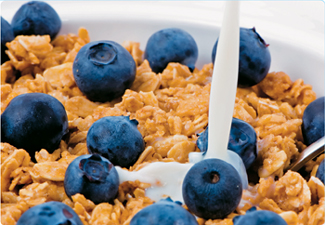26 Eat “Superfoods” to Stay Sharp As You Age
A few foods deserve to become dietary staples for their ability to boost memory, slow brain aging, and protect against cognitive decline. All these superfoods are stellar sources of antioxidants and have solid science behind their brain benefits. Antioxidants are critical for brain health because they fight free radicals, which can interfere with how your brain cells process nutrients, cause oxidative damage that can lead to cell death, and keep brain cells from communicating with each other, leading to memory loss. Make these antioxidant-rich foods a mealtime mainstay to mop up free radicals and keep your brain young.
Bet on Blueberries for Lifelong Brain Health
Blueberries contain a number of polyphenols, plant compounds that protect health. Of these, anthocyanins—water-soluble antioxidants that give fruits and vegetables a red or purple color—have shown particular benefit for the brain. In addition to their antioxidant and anti-inflammatory effects, anthocyanins may boost neuron signaling in brain centers associated with memory, as well as improve how the brain disposes of glucose, all of which may help prevent or slow memory decline. A 2010 study in the Journal of Agricultural and Food Chemistry found that older adults with mild memory problems who drank wild blueberry juice every day for twelve weeks showed improved scores on memory tests. Sprinkle a handful of blueberries on your oatmeal at breakfast, stir them into yogurt, swap your morning OJ for a glass of blueberry juice, or set out frozen berries for a cool summer dessert. Sugar wipes out anthocyanins, however, so don’t rely on a slice of blueberry pie (or jam or muffins) for your daily dose. Blackberries, raspberries, cherries, red grapes, pomegranates, red cabbage, and beets are also good sources of anthocyanins.
Cook with Curry for Clearer Thinking
Based on lab and animal studies, curcumin, the component of the curry spice turmeric responsible for its yellow color, appears to protect the brain in at least ten different ways. For example, it defends the brain against stress-induced memory problems, according to a 2009 study in the journal Neuropharmacology. Turkish researchers also showed that curcumin can help combat age-related cognitive decline stemming from elevated insulin levels ( 25). And a 2008 review of studies on the role of curcumin in Alzheimer’s found that the spice improves memory by delaying the breakdown of neurons, decreasing plaque formation, removing toxic metals like cadmium and lead, calming inflammation, and fighting free radicals. Typical uses for turmeric include Indian curries, but you can also add a teaspoon to soups, rice dishes, sauces, and marinades, or even to scrambled eggs. Consuming turmeric along with black pepper significantly increases your body’s ability to use curcumin (by up to 2,000 percent!), and healthy fats may enhance absorption as well.
25). And a 2008 review of studies on the role of curcumin in Alzheimer’s found that the spice improves memory by delaying the breakdown of neurons, decreasing plaque formation, removing toxic metals like cadmium and lead, calming inflammation, and fighting free radicals. Typical uses for turmeric include Indian curries, but you can also add a teaspoon to soups, rice dishes, sauces, and marinades, or even to scrambled eggs. Consuming turmeric along with black pepper significantly increases your body’s ability to use curcumin (by up to 2,000 percent!), and healthy fats may enhance absorption as well.
Pour an Occasional Glass to Protect Your Brain
Like blueberries, anthocyanins give red grapes their color. Purple grape juice and red wine are good sources, and vino also offers up another superstar antioxidant: resveratrol, found in the skins of grapes. Red wine contains higher concentrations of resveratrol than white wine (even though some varieties of white wine are made with red grapes) because it ferments with the skins longer during winemaking. Resveratrol boosts memory by limiting the breakdown of important neurotransmitters, according to a 2009 study in the European Journal of Pharmacology. And researchers at the Mount Sinai School of Medicine found that moderate red wine consumption helps prevent the formation of brain plaques in Alzheimer’s, thereby reducing risk of the disease. Other studies confirm that resveratrol’s antioxidant and anti-inflammatory activity protects the brain against age-related cognitive decline. Limit yourself to two glasses of red wine a week for women and three for men, though, since more can leach thiamin, a B vitamin that helps make necessary neurotransmitters and fights inflammation ( 25). Concord grape juice seems to be an equally healthy choice: A 2009 study in the British Journal of Nutrition found that the juice improved cognitive function in adults with early memory problems.
25). Concord grape juice seems to be an equally healthy choice: A 2009 study in the British Journal of Nutrition found that the juice improved cognitive function in adults with early memory problems.

 25). And a 2008 review of studies on the role of curcumin in Alzheimer’s found that the spice improves memory by delaying the breakdown of neurons, decreasing plaque formation, removing toxic metals like cadmium and lead, calming inflammation, and fighting free radicals. Typical uses for turmeric include Indian curries, but you can also add a teaspoon to soups, rice dishes, sauces, and marinades, or even to scrambled eggs. Consuming turmeric along with black pepper significantly increases your body’s ability to use curcumin (by up to 2,000 percent!), and healthy fats may enhance absorption as well.
25). And a 2008 review of studies on the role of curcumin in Alzheimer’s found that the spice improves memory by delaying the breakdown of neurons, decreasing plaque formation, removing toxic metals like cadmium and lead, calming inflammation, and fighting free radicals. Typical uses for turmeric include Indian curries, but you can also add a teaspoon to soups, rice dishes, sauces, and marinades, or even to scrambled eggs. Consuming turmeric along with black pepper significantly increases your body’s ability to use curcumin (by up to 2,000 percent!), and healthy fats may enhance absorption as well.